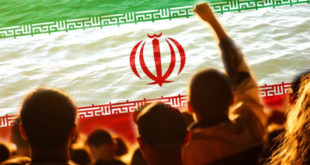The Biden administration deployed an aircraft carrier strike group in a bid to deter a multi-front war against Israel, but lack of a formal defense treaty with Israel and Congressional authorities could inhibit Washington’s ability to respond.
The Pentagon has begun surging air defense munitions and other equipment to Israel’s military as special operators from its elite Joint Special Operations Command (JSOC) remain poised to assist with intelligence and planning for potential hostage rescue operations by the IDF in Gaza, American officials said Monday.
Word of the additional support came a day after Defense Secretary Lloyd Austin announced the USS Gerald R. Ford aircraft carrier strike group in the Mediterranean Sea had been ordered to head towards Israel following Hamas’ unprecedented incursion into the country’s south.
The rampage by Hamas which began Saturday has left more than 900 Israelis dead – most of them civilians – and saw at least 100 Israeli hostages captured and forcibly brought back to Gaza.
Israel has declared war and vowed to depose the Islamist group from power in the Palestinian enclave, a campaign that Israeli officials have suggested could involve a protracted ground invasion of the densely populated territory.
The IDF said it had mobilized 300,000 troops and declared a full siege halting the flow of water, food and electricity into Gaza on Monday.
The arrival of the USS Ford – which is carrying an air wing and is accompanied by the guided-missile cruiser USS Normandy and four US Navy Arleigh Burke-class guided-missile destroyers – is intended to send an unmistakable warning to Iran and the militant groups it backs throughout the region not to join in the conflict by launching their own attacks against Israel, Biden administration officials said.
The strike group led by the Ford is capable of intelligence collection and “long-range strikes,” a senior US defense official told reporters on Monday, noting its arrival signals “the United States is postured to respond to any contingencies and minimize the risk of a wider conflict.”
The senior US official said Iran, Hezbollah and other groups backed by Iran’s Islamic Revolutionary Guard Corps (IRGC) “should think twice” before joining in the war.
“Iran-backed adversaries like Lebanese Hezbollah should not question the commitment of the US government to support the defense of Israel,” the official added.
“We believe that the folks in the region understand what those capabilities are,” the White House’s National Security Council coordinator John Kirby, a former US Navy rear admiral, told reporters Monday evening.
The Pentagon’s newly-confirmed top general, Chairman of the Joint Chiefs of Staff CQ Brown, offered his own warning.
“We want to send a pretty strong message. We do not want this to broaden and the idea is for Iran to get that message loud and clear,” Brown was quoted by reporters travelling with him to Brussels for this week’s NATO ministerial.
Beyond the military show of force, Biden administration officials across multiple agencies have been “flooding” high-level diplomatic phone lines in a bid to prevent the violence from spreading to other fronts, the senior defense official said.
Of particular concern are Lebanon, the West Bank and Syria, where a variety of militias espouse hostility to Israel, some as part of an IRGC-enlisted campaign to encircle the country with overwhelming projectile weaponry.
“Right now we are monitoring across the region for any indicators or warning that these groups would consider piling on or entering this conflict in a way that escalates it,” the senior US defense official told reporters.
“We are working with Israel and with our partners across the region to contain this to Gaza,” the official explained.
Axios reported on Monday that the United Arab Emirates had warned Syria’s Bashar al-Assad regime not to allow any attacks from its territory to be staged towards Israel. The UAE became the first Arab state to normalize ties with Israel as part of the Abraham Accords and with the Assad regime since Syria’s civil war, and maintains close relations with both.
Israel has carried out regular airstrikes on Iran-linked targets in Syria in recent years in a bid to keep Iranian weapons systems away from striking distance of its borders.
The US has quietly provided intelligence in the past to support the Israeli campaign and has occasionally carried out its own airstrikes against the militias in response to rocket and drone attacks targeting US troops there.
Iran’s leadership lauded Hamas’ bloody assault on Israel but has denied involvement in planning it or carrying it out. “The era of domination and tyranny of the terrorist Zionist regime has come to an end,” Ali Veliyati, senior adviser to Iran’s supreme leader Ayatollah Ali Khamenei, said Saturday, according to Iran’s Fars News Agency.
Biden administration officials say they do not have any evidence to indicate Iran’s involvement in the latest attacks. “We are looking through the information streams. We haven’t seen tangible evidence that Iran was directly involved,” Kirby said Monday.
Kirby accused Iran of bearing “some complicity” in the latest assault for its long history of arming and training Hamas’ militant wing. Iran provides some 90% of the funding for Izz-eddin al-Qassam Brigades, a former senior US defense official told Al-Monitor.
Administration officials pushed back on criticism over a decision to unlock $6 billion in restricted funds to fund humanitarian initiatives in Iran as part of a mutual prisoner exchange last month. “None of the funds that were part of that deal have even been spent,” a senior administration official told reporters Saturday, adding, “None of those funds will ever be accessed by Iran.”
Risk of multi-front war
Palestinian factions in Gaza have fired some 4,400 rockets towards Israel since Saturday, the IDF said.
But in Washington, officials appeared to be even more concerned about southern Lebanon, where Hezbollah is believed to have amassed a deep stockpile of projectile munitions that far eclipses the arsenals belonging to the Gaza factions.
In nearby Syria and Iraq, the IRGC has also continued to provide arms to militias it supports despite an informal detente, US officials have said.
Israeli and American war planners have long feared a multiple-front barrage confronting Israel, suggesting it could spiral into a wider conflict that could see Iran and its proxies target Arab states in the Gulf region which host American troops.
Anxieties over a potential outbreak on Israel’s northern front peaked again Monday when the Shia militant group fired rockets and artillery in retaliation for the death of three of its fighters killed in Israeli strikes earlier in the day.
Israel launched artillery and helicopter strikes into Lebanon in response to an infiltration by gunmen across the border, at least two of whom were killed as the result of a firefight that wounded Israeli soldiers and left an IDF deputy brigade commander dead. The incursion was later claimed by the Palestinian Islamic Jihad, the second-largest militant group in Gaza.
Hezbollah has praised Hamas’ operation and suggested on Monday that its forces would get involved in the conflict if Israel launches a ground incursion into Gaza.
Few US options
Biden administration officials remained vague when pressed by reporters on Monday as to what military support they intended to offer Israel beyond the show of force and resupply to the IDF.
The senior defense official declined to say when asked by Al-Monitor whether there would be a role for the US military in hostage recovery operations should Americans be confirmed to be among those kidnapped by Hamas and taken to Gaza.
“There is no intention to put US boots on the ground,” Kirby affirmed on Monday, adding that he was not aware of any effort by the Biden administration to seek Congressional authorization to use force against Hezbollah should it open a new front against Israel.
When asked by Al-Monitor, the senior defense official confirmed that neither Hamas nor Hezbollah are designated as legal targets under the 2001 Authorization of the Use of Military Force (AUMF), legislation which the Biden administration has leveraged to target groups like the Islamic State and other Al-Qaeda offshoots.
Instead, Biden has authorized occasional US strikes in the past on IRGC-backed militias in Syria citing self-defense under Article II of the US Constitution, but only in response to direct attacks on American forces based there.
Members of the Pentagon’s elite JSOC in the region have been instructed to prepare to offer intelligence and operational planning support to the IDF for potential hostage rescue missions, two US military officials confirmed to Al-Monitor.
One official who spoke on the condition of anonymity declined to discuss the JSOC elements’ locations or specific activities, but stressed that the administration was unlikely to order the insertion of special operations forces into Gaza or any other active conflict situations. “All that’s going to do is bring additional instability,” the official said.
A former senior US defense official speaking to Al-Monitor on the condition of anonymity agreed, citing the density of Gaza’s urban environment.
JSOC elements were already poised to collect intelligence as the Biden administration sought to verify whether any American citizens are among the more than 100 hostages brought back to Gaza by Hamas and PIJ, the aforementioned military official suggested.
“They’ve been tracking this since the very beginning,” the official noted. But it remained unclear whether the Israelis are seeking US intelligence support, or are even interested in hostage rescue operations at this point. “We’re getting more information from them than they need from us,” the source added.
Kirby on Monday stressed that the US government was not yet able to confirm whether any Americans are among the hostages being held in Gaza, despite statements affirming such by Israeli officials. “We are working literally by the hour to try to get more information about these unaccounted-for Americans,” Kirby said.
“Even if they are in tunnels, they likely can be detected at least,” the second former senior US defense official told Al-Monitor, in an oblique reference to the technology used by US special operators in prior hostage rescue missions.
A Hamas spokesman on Monday announced the group would execute one hostage for every Israeli airstrike that kills civilians in Gaza without warning.
Speaking to reporters on Monday, the current senior US defense official demurred when asked whether Pentagon officials would draw a line under the death toll Israel’s operation has inflicted among civilians in Gaza.
“Mitigating collateral damage and civilian casualties is always part of the conversation with all of our allies and partners. It’s no different with Israel,” the official said, before referring back to Hamas’ rampage.
“This is ISIS-level savagery, and we back Israel’s right to respond,” the official added.
 Eurasia Press & News
Eurasia Press & News



